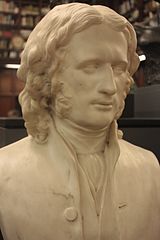Edward Irving: Preacher, Prophet and Charismatic Theologian
The Caledonian Chapel
He was formally inducted on October 16th as the ordained minister of The Caledonian Chapel. The church had been without a pastor for a year and attendance shrunk down to fifty, when Irving became pastor. His preaching brought life to the congregation. George Canning, a leader in the House of Commons attended a service and was quite taken by Irving’s preaching. Soon after while addressing parliament, he mentioned that Irving’s sermon was the most eloquent that he had heard.5 Canning began to attend regularly and encourage others to visit as well. Canning called Irving, “the greatest orator of our times.” His influence added to the growing popularity of Irving’s preaching and within nine months the 500-seat sanctuary was overflowing with over 1000 people clamoring for a seat. It was during this time that Samuel Coleridge and other notable people of London came to hear “the greatest orator of our times.”
Irving never lost his zeal for study and theological inquiry. Although he studied theology at the University at Edinburgh as a part-time student, he altogether missed the typical dislike of theology.6 His study led him to publish his first book in 1823, Oracles of God: Four Orations. For Judgement to Come: An Argument. In Nine Parts. This two-part work was a call to reclaim the life of God found in the truth of God’s Word. Biographer Andrew Drummond writes concerning Oracles of God, “Irving is craving for a religion of the heart.”7 In the book Irving writes,
In Catechism, religion is presented to the intellect, chiefly; in the Bible it is presented more frequently to the heart, to the fancy, to all the faculties of the soul. In early youth, an association takes place between religion and intellect…. The solemn stillness so favourable to rapt communion, is destroyed at every turn by suggestion of what is orthodox and evangelical; the spirit of the reader becomes lean, being fed with abstract truths; his temper ungenial; his prayers undevout recital of opinions. Intellect, old intellect hath the sway.8
The second part entitled For Judgement to Come is a continuation of Irving’s commentary on the lack of life in Christian practice and in the ministry of preaching. Drummond remarks, “Irving seems to have realized the weakness of the Presbyterian appeal to the intellect, the Methodist appeal to the emotions and the (contemporary) Anglican appeal to the moral sense.”9
The Regent Square Church
Irving’s popularity continued. The overcrowded Caledonian Chapel caused the board of trustees to look into constructing a new facility. There had been some talk of building a national cathedral for the Church of Scotland in London.10 With the support of Irving, the Caledonian Chapel rallied support from the Scottish population of London to build it. The construction was completed in Regent Square and the doors were officially opened on May 11, 1827. Dr. Chalmers gave the inaugural address. The new Scottish Kirk took on the name “Regent Square Church.”
“I cannot find by what writ of God any part of the spiritual gift was irrevocably removed from the Church. I see, indeed, that she hath lost the power which heretofore made her terrible as an army with banners.”
—Edward Irving
The point at issue is simply this; whether Christ’s flesh had the grace of sinlessness and incorruption from its proper nature, or from the indwelling of the Holy Ghost. I say the latter. I assert, that in its proper nature it was as the flesh of his mother, but, by virtue of the Holy Ghost’s quickening and inhabiting of it, it was preserved sinless and incorruptible. This work of the Holy Ghost, I further assert, was done in consequence of the son’s humbling himself to be made flesh.12
For Irving, the issue was to preserve the inter-relatedness of the Trinity as revealed in the incarnation; Jesus, the Son of God submitted to the Father God and remained set apart from sin by the Holy Spirit of God. Reformed theology driven by the human-centered forces of modernity had overlooked and side-lined the role of the Holy Spirit in the person of Christ. Irving wrote,
My Christ is the Trinity manifested;…I have the Father manifest in everything which He doth; for He did not His own will, but the will of His Father. I have the Son manifested, in uniting His Divinity to a humanity prepared for Him by the Father; and in making the two most contrary things to meet and kiss each other…. I have the Holy Spirit manifested in subduing, restraining, conquering, the evil propensities of the fallen manhood, and making it an apt organ for expressing the will of the Father…13

Bust of Edward Irving by Hamilton MacCarthy (1867). Image: Wikimedia Commons
Yet the “sinful substance” of the human nature of Christ as taught by Irving was not received without controversy.14 Henry Cole, an Anglican minister attended an Irving sermon in October 1827 and asked Irving to explain himself in using the term “that sinful substance” in reference to the human body of Christ. Cole published the interview and an accompanying sermon in December detailing the doctrine that Irving preached and declaring it heretical.15 This sparked a six-year “tract war” between Cole and Irving, where each wrote back and forth, Cole attacking the doctrine and Irving defending it.
Category: Church History, Spring 2002


